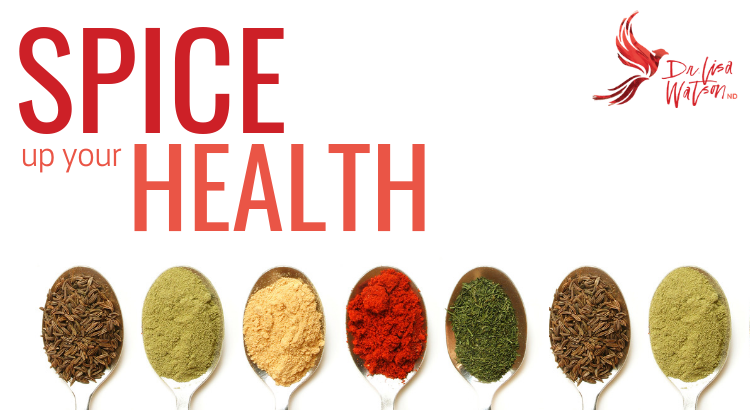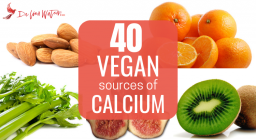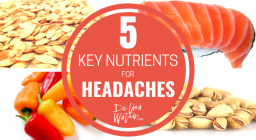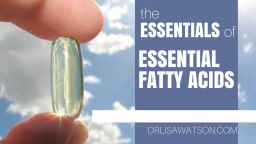
When you think of a healthy, balanced diet you probably think of the Four Food Groups – whole grains, lean meats/ meat alternatives, fruits and vegetables, and healthy fats. But a healthy diet should also include an abundance of the ‘fifth food group’ – spices!
Spices used in cooking are the original herbal medicines. Many of the spices in our kitchen pantry have been used for hundreds, or thousands of years to enhance flavour – and to enhance health.
Spices have more antioxidant potential (ORAC score) by weight than fruits and vegetables. Antioxidants are infinitely useful in the body – they prevent cancer, Alzheimer’s disease, heart disease, premature aging and chronic diseases.
Below are sixteen spices that can easily be incorporated into your diet to spice up your food, and your health.
Cardamom
A spice native to India, cardamom is a member of the ginger family. Cardamom contains oils with “carminative” properties – they help to stimulate digestion and relieve flatulence. Chewing a teaspoon of cardamom seeds after eating can relieve indigestion and decrease cramping and gas pains.
Cayenne Pepper
Cayenne is an excellent anti-inflammatory and also aids in digestion. Research also has shown that capsaicin, found in cayenne peppers, can relieve pain from achy joints and sore muscles when applied directly to the painful area. Cayenne pepper can also relieve the pain of cluster headaches when applied intra-nasally.
Cilantro
Cilantro is used extensively in Thai and Mexican cuisine. Cilantro is effective at mobilizing heavy metals including mercury, cadmium, lead and aluminum. It can be used during detoxification protocols, but should be used under supervision of a Naturopathic Doctor.
Cinnamon
 Cinnamon is one of the richest sources of antioxidants. It is a warming spice and can be used to relieve nausea and vomiting. Cinnamon is anti-inflammatory and has insulin-like qualities. Recent research shows that ¼ teaspoon per day can lower blood sugar, cholesterol and triglyceride levels which make it beneficial for the treatment of type 2 diabetes and heart disease. Cinnamon is also anti-microbial and can stop the growth of bacteria, yeast and fungi.
Cinnamon is one of the richest sources of antioxidants. It is a warming spice and can be used to relieve nausea and vomiting. Cinnamon is anti-inflammatory and has insulin-like qualities. Recent research shows that ¼ teaspoon per day can lower blood sugar, cholesterol and triglyceride levels which make it beneficial for the treatment of type 2 diabetes and heart disease. Cinnamon is also anti-microbial and can stop the growth of bacteria, yeast and fungi.
Cloves
Cloves are the unopened buds of an evergreen tree. Clove oil is traditionally used as a treatment for toothache and as a mouthwash because of it’s antibacterial effects. As a spice clove is warming and can reduce congestion and stimulate healthy digestion.
Cumin
 Cumin is one of the oldest culinary spices. It is a member of the carrot family and has a similar appearance, fragrance and medicinal properties as caraway seed. Cumin supports digestion by decreasing gas and bloating. Additionally, cumin has been shown in studies to suppress the onset of colon cancer
Cumin is one of the oldest culinary spices. It is a member of the carrot family and has a similar appearance, fragrance and medicinal properties as caraway seed. Cumin supports digestion by decreasing gas and bloating. Additionally, cumin has been shown in studies to suppress the onset of colon cancer
Fennel
My favourite spice for the treatment of colic and gas in infants. Fennel is also useful in supporting liver detoxification. Brew a fennel tea and give a teaspoon to infants to support digestion and relief the pain and discomfort of colic or gas.
Garlic
Garlic is one of the most popular herbal medicines and is found in most kitchens as well. Garlic is a potent antimicrobial and can be used during acute or chronic infections (such as ear infections, sore throat, coughs, colds and yeast infections). Garlic can also reduce cholesterol and normalize high blood pressure. Regular consumption of garlic can prevent cancer and it is currently being studied for its ability to destroy cancer cells and disrupt the metabolism and growth of tumours.
Ginger
Ginger is a common ingredient in Asian and Indian cooking as well as giving the flavour to Ginger Ale. Ginger is high in antioxidants and can protect against aging and development of chronic disease. Ginger is best used for decreasing indigestion, treating gas and abdominal spasms and managing nausea. Ginger has been shown in multiple studies to be an effective treatment for nausea associated with motion sickness, pregnancy and hangovers. Ginger tea is easily made by adding a few thin slices of ginger to hot water.
Nutmeg
Nutmeg is most often used during the holiday season, but can be used to relieve the joint inflammation associated with gout. Toxic in large doses, nutmeg should not be used as an herbal medicine in children or pregnant women.
Oregano
Oregano has potent antibacterial properties. Oregano is effective at destroying unfriendly intestinal bacteria without damage to the friendly bacteria. Oregano is also effective at eliminating yeast (Candida albicans) overgrowth in the body, and particularly in the sinuses.
Rosemary
 As with many other spices, rosemary helps increase blood flow to the digestive tract, supporting digestion and relieving gas. As an oil, rosemary increases circulation and relieves muscle aches when applied directly to painful muscles.
As with many other spices, rosemary helps increase blood flow to the digestive tract, supporting digestion and relieving gas. As an oil, rosemary increases circulation and relieves muscle aches when applied directly to painful muscles.
Saffron
Notorious for being the world’s most expensive spice, saffron has been shown to be an effective treatment for mild to moderate depression.
Thyme
Thyme is antimicrobial and is useful for cough and colds. Thyme can also reduce the pain of menstrual cramps and calm stomach cramping. Applied topically to cuts and abrasions, thyme is an effective antiseptic preventing bacterial infection.
Turmeric
 Turmeric is a traditional Indian spice and is best known in North America as the spice that gives mustard it’s characteristic yellow colour. Turmeric is a powerful anti-inflammatory and anti-oxidant. It is used to treat arthritis, decreasing pain and joint inflammation. Turmeric is useful for any inflammatory condition including inflammatory bowel disease, Crohn’s disease, ulcerative colitis, cystic fibrosis, heart disease and cancer. Curcumin (a component of turmeric) may also be used in the prevention of Alzheimers by preventing plaque formation in the brain. Research is currently being done to assess the ability of turmeric to prevent the spread (metastasis) of cancer.
Turmeric is a traditional Indian spice and is best known in North America as the spice that gives mustard it’s characteristic yellow colour. Turmeric is a powerful anti-inflammatory and anti-oxidant. It is used to treat arthritis, decreasing pain and joint inflammation. Turmeric is useful for any inflammatory condition including inflammatory bowel disease, Crohn’s disease, ulcerative colitis, cystic fibrosis, heart disease and cancer. Curcumin (a component of turmeric) may also be used in the prevention of Alzheimers by preventing plaque formation in the brain. Research is currently being done to assess the ability of turmeric to prevent the spread (metastasis) of cancer.
Wasabi
The hot Asian spice commonly served with sushi has been shown in studies to kill Helicobacter pylori (H. pylori) bacteria in the stomach. This bacteria is associated with the development of ulcers.
Remember to replace your spices frequently. The antioxidant and other medicinal compounds in spices deteriorate with age. Keep spices in well sealed glass containers and replace after their best-before date or every 6 months.
Disclaimer
The advice provided in this article is for informational purposes only. It is meant to augment and not replace consultation with a licensed health care provider. Consultation with a Naturopathic Doctor or other primary care provider is recommended for anyone suffering from a health problem.


















[…] They are the “original herbal medicine”. […]
[…] Spices are an amazing way to increase antioxidants in your diet, and cinnamon is especially useful for women with PCOS because it can help to regulate blood sugar. Sprinkle it on apples, oats or quinoa in the morning, add it to teas and use it in flavourful stews or curries. […]
[…] Spice Up Your Health – The Fifth Food Group by Dr Lisa Watson, ND. 2 Adding Spice for a Healthier Life by Megan Tempest, RD in Today’s […]